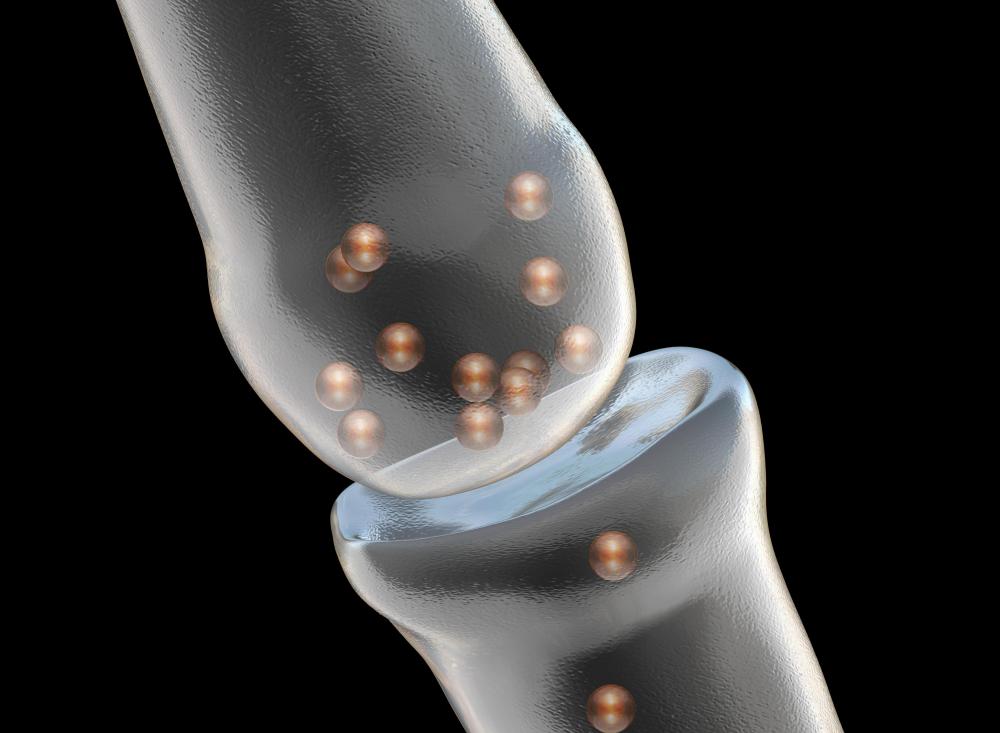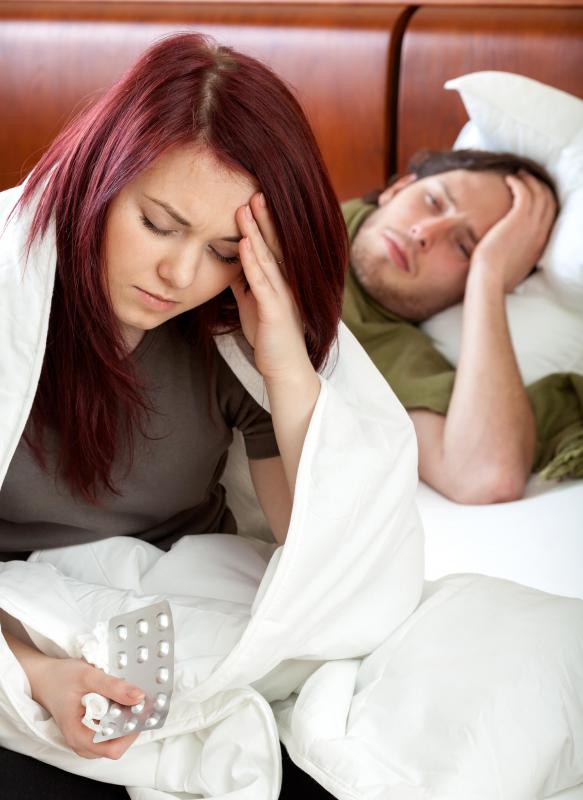At TheHealthBoard, we're committed to delivering accurate, trustworthy information. Our expert-authored content is rigorously fact-checked and sourced from credible authorities. Discover how we uphold the highest standards in providing you with reliable knowledge.
What Is GABA?
Gamma-aminobutyric acid (GABA) is an amino acid that is the second most prevalent neurotransmitter in the brain. Amino acids build proteins in the body, and neurotransmitters are chemicals needed for the synapses to transfer information in human gray matter. This amino acid has an inhibiting effect, calming excited nerve impulses. This can make a person feel more tranquil and give him or her a sense of wellbeing. Without this inhibitory neurotransmitter, a person would constantly remain on edge and anxious, and not have the ability to relax.
A person who is feeling stressful and anxious may be suffering from a deficiency of this vital biochemical. This deficiency can cause headaches, depression, irritability, palpitations, and other symptoms. Many people who suffer from anxiety disorder are prescribed tranquilizers in the benzodiazepine family, which can produce uncomfortable side effects and become addictive. Natural remedies are a healthier option. Dietary supplements of GABA are available, but instead of containing the neurotransmitter they contain substances that help the body produce its own.

L-theanine and glutamine are amino acids that are precursors of gamma-aminobutyric acid. Eating a diet rich in sources of these substances can help the body produce its own calming neurotransmitters. L-theanine occurs naturally in the human body. Supplements are available that contain this amino acid, and drinking green tea will also increase one’s L-theanine levels, inducing a feeling of calm and raising the level of GABA.

Eating foods rich in glutamine will also help the body produce gamma-aminobutyric acid. Complex carbohydrates are a good source of glutamine. This GABA precursor is found in broccoli, citrus fruits, whole grains, bananas, and spinach. Herbal teas, almonds, walnuts, and brown rice also contain enough glutamine to help the body produce GABA.
Gamma-aminobutyric acid can prevent insomnia by decreasing the firing of neurons and promoting restful sleep. Its calming properties can also elevate a person’s mood and have a beneficial effect on blood pressure. A person with sufficient levels of GABA will have improved powers of concentration over someone who is deficient in this amino acid.

GABA can also help slow the effects of aging by stimulating the pituitary gland to produce human growth hormone (HGH). As a person ages, the production of this hormone slows down. This decrease in HGH causes wrinkles and degenerative diseases, such as arthritis, so adding supplements or foods rich in gamma-aminobutyric acid precursors can slow the effects of aging. One form of cerebral palsy is caused by an inability of the body to absorb gamma-aminobutyric acid, demonstrating how vital this neurotransmitter is for health.
AS FEATURED ON:
AS FEATURED ON:

















Discussion Comments
I've heard that GABA has very low bioavailability and doesn't actually work.
GABA is dirt cheap as a supplement so companies can't make money. I like it better than St Johns Wort as it helps me sleep deeper and get more REM sleep. Body composition has been leaning out too.
Why GABA? If it is as good as St. John's Wort, why has there been little talk on the radio or news advertising it?
How often and how long do you take GABA?
Do you need to take any other supplement with GABA?
Wow, that explains it all. I am going to try GABA. I have headaches, anxiety, stress, palpitations, irritability. I wonder if this helps minimize perimenopause and menopause symptoms plus the weight issue that goes along with this.
I believe an increase in GABA helps promote sleep. Since I've been drinking green tea and eating spinach for lunch every day, I've been falling asleep at night much more easily than I used to when my diet was horrible.
@kylee07drg – I think it depends on the person. GABA relieves anxiety to some extent in people who aren't suffering from a bad case of it, but some people need to do more than just eat the right foods.
I have social anxiety disorder, and though I eat many of the foods on this list, I still suffer from the symptoms. I have to be on medication for it, and this is more than just a supplement that makes me produce more GABA.
If we can increase the GABA our brain makes just by eating certain foods, why don't we all do this? I don't know a single person who couldn't use a little more relaxation in their lives.
I wonder how strong the effect of eating broccoli, oranges, and bananas is. Would it be something noticeable, or would it be a more gradual relaxation that occurs over time?
I need to look into this GABA supplement! I like the idea of something that would make my brain produce more of a natural substance. I don't like taking chemicals, but I don't mind taking something that would make me produce more of my own.
Post your comments